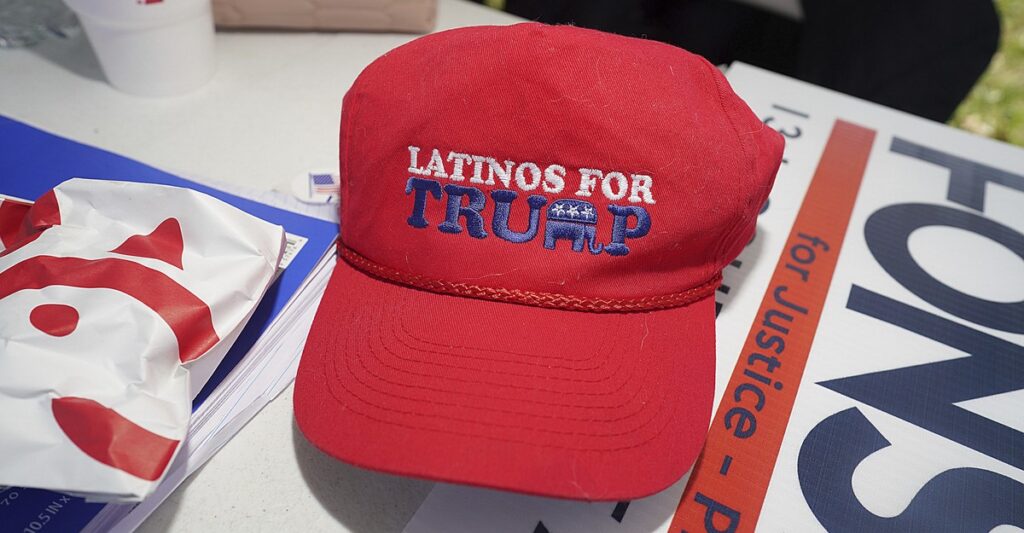[ad_1]
The narrative of America as the land of the free has ceased to be many voters’ top priority.

Donald Trump called Latino migrants rapists, murderers, and drug dealers. After one of his final rallies, at which a comedian described Puerto Rico as “a floating island of garbage,” many people, myself included, thought Latinos would decisively turn against him. We were wrong. Exit polls show that 46 percent of Latinos voted for him, and among Latino men, he won 55 percent of the votes—a huge increase from 36 percent in 2020.
Many Americans are baffled. How could Latinos—many of whose family members could be targeted by the mass deportations that the Trump team is promising—make this choice? But seeing the results—and hearing from Latino Trump voters—it made perfect sense to me. This was, simply, a vote for capitalism.
American values are especially powerful in groups with large immigrant populations; those values are what draw people here. Though many of America’s earliest immigrants came here seeking relief from famine and poverty, our freedoms—to worship freely, to speak freely—are what we became famous for. The promise was mythologized on the Statue of Liberty: our welcome to the tired, poor, huddled masses, who yearned not to grow filthy rich, but to be free. In the 20th century, immigrants fled religious persecution and political oppression to find in America freedoms that they, and their descendants, cherished and took seriously. I was raised by my grandfather, a Puerto Rican veteran of World War II. We didn’t have a lot of money, but I was taught that our political freedoms and our moral obligation to democracy mattered more.
At the same time, from the very beginning, the land of the free has also been about the freedom to make and spend money. America put God on our money, but for many Americans, money is God. This nation put profit over morality through centuries of slavery. Individual expediency in the name of capitalism is as American as the right to bear arms. Around the world, no idea has been marketed more effectively than the American dream. America: where even corporations can be people! And when we talk about someone living “the American dream,” we aren’t referring to their trips to the voting booth or the way they utilize their freedom of assembly. We are praising people who have achieved financial success and accumulated material things.
We deify and elevate these people in the media, in social settings, and online, and we rarely question the ethical price that may have been paid to get them there. Just look at Trump, the “self-made man” whose father’s real-estate fortune launched his career. Until Trump became a political villain, he was an American success story. He was regularly on Oprah and sung about in hip-hop songs, and he had that cameo in Home Alone 2. And the truth is, for many Americans—Latinos included—he still is that man. He is living the dream; he has buildings with his name on them.
Latinos broke for Trump for many complicated reasons, including sexism, religious conservatism, racism (or a desire to assimilate into whiteness). But the simplest answer is often the best: To many, Trump represents prosperity. And the ability to financially prosper is what America is all about. People believe this, because America told them so.
In polls, Latinos consistently put economic issues at the top of their list of concerns. After the election, the media was full of voters reaffirming this. As one Pennsylvania voter of Puerto Rican descent told NBC News, he wasn’t bothered by Trump’s comments about the island: “For me, it’s work. It’s the economy. It’s groceries.”
Why, one might ask, was this narrative so much more persuasive to Latinos than to Black Americans? Perhaps because the American dream wasn’t created with Black people in mind. The civil-rights movement was painstakingly built by exploiting America’s political rights to assembly and free speech. When Black Americans in the North couldn’t buy homes because of redlining, many could still—despite obstacles—vote. Perhaps Black voters understood better than many Latino voters an essential truth: Access to the American dream is elusive, but America’s freedoms are indispensable.
One of the great takeaways of this election is that the narrative of America as the land of the free has ceased to be many voters’ top priority. This election was a battle for the soul of the nation—but the fight wasn’t between American ideals and un-American ones. It was between our best and worst selves.
[ad_2]
Source link

